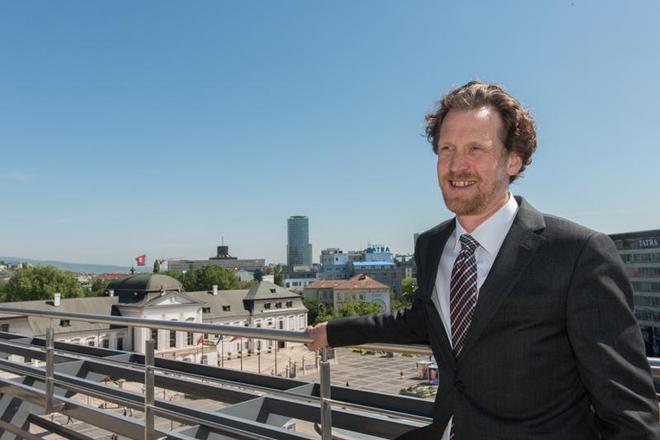When I came to Bratislava in autumn of 2014 to assume my post as Austria’s Ambassador, we lived in a different Europe: the refugee crisis had not yet escalated (though it certainly did not materialise out of the blue…), Schengen was not questioned, Paris and Brussels were still unwounded by terrorist attacks, and Brexit was a hypothetical possibility no one took quite seriously. This is not the place to moan about the loss of some ideal, quiet Europe that probably has never existed anyway. It is simply a fact that the European and the international environment is rapidly changing.
This is why friendly, stable and close ties among European countries, and especially among neighbouring countries like Austria and Slovakia, are more important than ever. Fortunately, I can state that the relations between our two countries are characterised by the high quality we should wish for in these turbulent times.
The close relationship is demonstrated by the high frequency of political consultations and visits. During my term as ambassador, I had the pleasure to organise visits of the Austrian president, the chancellor, the vice chancellor, the minister of foreign affairs, and many other ministers and leading politicians. Many of them will re-visit Bratislava in the upcoming months with Slovakia holding the Presidency of the EU Council.
On the one hand, the intensity of the political contacts is mirroring the necessity of close cooperation and coordination in the European agenda where Austria and Slovakia, as members of the Schengen area and the eurozone, share many of interests. On the other hand, the close contacts are also due to the huge interdependence of our countries in many areas.
Take for example the economy. Slovakia is one of Austria’s major trading partners. The trade volume between Austria and Slovakia is bigger than, let’s say, between Austria and Spain or Japan. Thanks to the EU’s single market and global value chains, for example in the automotive sector, it is perhaps misleading to call Slovakia simply a “partner”. In fact, our economies are thoroughly interlinked and interwoven. Austria is the second largest investor in Slovakia. Approximately 2,500 Austrian companies are doing business in Slovakia. Understandably, they are interested in a predictable legal and judicial environment. They are currently employing around 40,000 people, and some of them would like to hire even more, though it is not easy to find them. Therefore, Austria has supported the (re-)introduction of dual education in Slovakia. Hopefully, this will turn out to be a major success, as it has been in Austria for decades.
Culture is another field of intense contacts and exchange. The Austrian Cultural Forum is very successful in bringing Austrian artists to Slovakia, and it is not difficult to convince them to come, because they know that Slovakia is so close – not only geographically, but also culturally. I am delighted by the huge attention writers like Martin Pollack and Robert Menasse or the sculptors Deborah Sengl and Erwin Wurm have received in Slovakia. Important topics, like the refugee crisis, have been dealt with also in the cultural sphere, including through our cooperation with Kunsthalle Bratislava at the very important show “Fear of the Unknown” (still running). Slovakia can be proud to have such internationally renowned curators like Juraj Čarný, Richard Gregor and Lenka Kukurová, who are highly regarded even in Austria’s competitive art world.
As mentioned above, in most fields Austrian-Slovak relations are defined by a congruence of interests. Still, even in the best relationships there can be a divergence of opinion in specific regards. It is no secret that Austria has a clear policy of rejection of nuclear energy, whereas Slovakia is running two nuclear power plants. Two new units at the Mochovce power plant are supposed to be switched on in the near future. Maximum transparency and intense communication, not only among experts, will be needed when confronted with the contrasting approaches.
Compared to the 1990s, the distance between Austria and Slovakia has decreased. Thousands of Slovaks have moved to Austrian towns and villages in the border region. Who could have imagined that two decades ago? Also, cross-border infrastructure has significantly been improved: there are frequent trains from Vienna to Bratislava and since 2007 the highway is connecting our capitals. I also would be happy to see significant improvements of the infrastructure across the Morava river. The bridge for bicycles near Schlosshof/Devínska Nová Ves is a success, but we need more bridges. In that regard, intense talks between Austrian and Slovak experts are on the way.
Austrian diplomats avoid calling Austria a “small” country. We should not make ourselves smaller than we are. Still, it is not easy for countries of the size of Austria or Slovakia to establish a firm presence in the mental map of the population even in the close neighbourhood. Many people in Austria still do not know enough about Slovakia. The Presidency of the Council of the EU therefore is a great opportunity to increase the visibility of this successful and beautiful country.
By Helfried Carl, Austrian Ambassador to Slovakia


 Austrian Ambassador Helfried Carl. (source: Jana Liptáková)
Austrian Ambassador Helfried Carl. (source: Jana Liptáková)